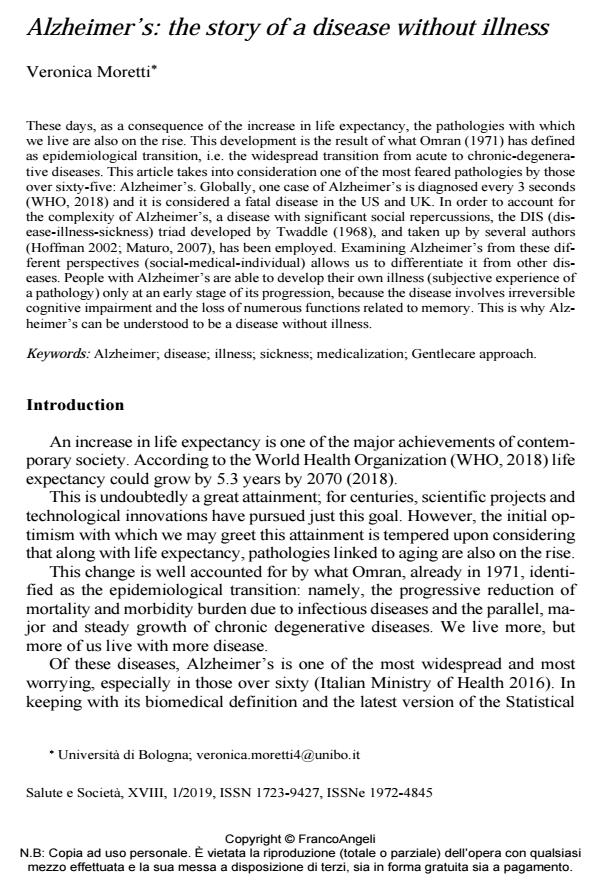Alzheimer’s: the story of a disease without illness
Titolo Rivista SALUTE E SOCIETÀ
Autori/Curatori Veronica Moretti
Anno di pubblicazione 2019 Fascicolo 2019/1
Lingua Inglese Numero pagine 16 P. 134-149 Dimensione file 220 KB
DOI 10.3280/SES2019-001009
Il DOI è il codice a barre della proprietà intellettuale: per saperne di più
clicca qui
Qui sotto puoi vedere in anteprima la prima pagina di questo articolo.
Se questo articolo ti interessa, lo puoi acquistare (e scaricare in formato pdf) seguendo le facili indicazioni per acquistare il download credit. Acquista Download Credits per scaricare questo Articolo in formato PDF

FrancoAngeli è membro della Publishers International Linking Association, Inc (PILA), associazione indipendente e non profit per facilitare (attraverso i servizi tecnologici implementati da CrossRef.org) l’accesso degli studiosi ai contenuti digitali nelle pubblicazioni professionali e scientifiche.
These days, as a consequence of the increase in life expectancy, the pathologies with which we live are also on the rise. This development is the result of what Omran (1971) has defined as epidemiological transition, i.e. the widespread transition from acute to chronic-degenerative diseases. This article takes into consideration one of the most feared pathologies by those over sixty-five: Alzheimer’s. Globally, one case of Alzheimer’s is diagnosed every 3 seconds (WHO, 2018) and it is considered a fatal disease in the US and UK. In order to account for the complexity of Alzheimer’s, a disease with significant social repercussions, the DIS (disease-illness-sickness) triad developed by Twaddle (1968), and taken up by several authors (Hoffman 2002; Maturo, 2007), has been employed. Examining Alzheimer’s from these different perspectives (social-medical-individual) allows us to differentiate it from other diseases. People with Alzheimer’s are able to develop their own illness (subjective experience of a pathology) only at an early stage of its progression, because the disease involves irreversible cognitive impairment and the loss of numerous functions related to memory. This is why Alzheimer’s can be understood to be a disease without illness.
Parole chiave:Alzheimer; disease; illness; sickness; medicalization; Gentlecare approach.
- Try to Look Again: A Phenomenological Study of Recognising Humanness in People Living With Advanced Dementia Jesper Bøgmose, Benjamin Olivares Bøgeskov, Tom Dening, Bente Martinsen, in Scandinavian Journal of Caring Sciences e70071/2025
DOI: 10.1111/scs.70071 - Implementing Twaddle Triad to Reach a New Framework for an Integrative and Innovative Medicine Davide Costa, Raffaele Serra, in Journal of Multidisciplinary Healthcare /2024 pp.4907
DOI: 10.2147/JMDH.S491021
Veronica Moretti, Alzheimer’s: the story of a disease without illness in "SALUTE E SOCIETÀ" 1/2019, pp 134-149, DOI: 10.3280/SES2019-001009